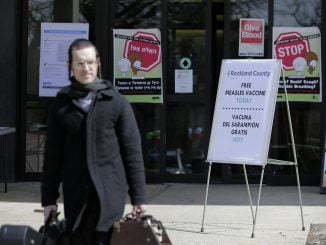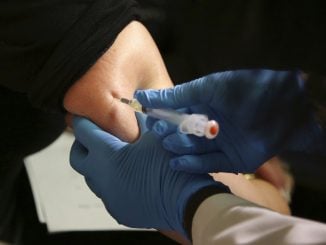RALEIGH — The Food and Drug Administration approved a kid-sized emergency use (EUA) COVID-19 vaccine produced by Pfizer/BioNTech on Oct. 29.
The Biden administration said it plans to distribute enough doses for the nation’s 28 million 5- to 11-year-olds as soon as the Centers for Disease Control and Prevention (CDC) gives its final decision anticipated to come as early as Nov. 2.
The Food and Drug Administration’s (FDA) approval comes after the agency’s Vaccines and Related Biological Products Advisory Committee voted 17 to zero to approve child doses on Oct. 27. One member abstained, Michael Kurilla, the director of the Division of Clinical Innovation at the National Institutes of Health.
“A vote ‘no’ would have been interpreted as a vote against the vaccine itself rather than the administration of the vaccine,” Kurilla said of his abstention. “There clearly are children with risk factors who could potentially benefit from a vaccine, but I don’t see the need for ’emergency use’ of this vaccine across the entire age group and would have preferred a more nuanced approach.”
Prior to the meeting, the advisory committee was supplied with an 82-page briefing document outlining the Pfizer pediatric age doses and related study information.
Kids will get two doses three weeks apart. The dose size is a third of the amount of a teen and adult dose. Pfizer’s study found the smaller doses had a more “favorable safety and tolerability profile,” and that side effects for kids aged 5-11 is “generally comparable to those observed in participants 16 to 25 years of age.”
During the meeting, multiple members of the FDA advisory panel expressed concern about rushing to approve a vaccine for children, who represent the lowest COVID risk group.
Kim Witczak, the consumer representative on the FDA’s Psychopharmacologic Drugs Advisory Committee, was vocal about slowing down the push to give the COVID shots to kids.
“Is there really an emergency with this age group?” Witczak asked. “Or is it being driven by a larger political agenda?”
Dr. James Hildreth said, “It just seemed to me that in some ways we’re vaccinating children to protect the adults when it should be the other way around.”
“If 30 million children already have some form of immunity, they’ve made their contribution to herd immunity already and our focus should be to get the adults vaccinated to protect the children,” said Hildreth, who later added he supports vaccinations for kids who have heightened health concerns.
“I’m just worried that if we say ‘yes’, that the states are going to mandate administration of this vaccine to children in order to go to school, and I do not agree with that,” said Dr. Cody Meissner. “I think that would be an error at this time until we get more information about the safety.”
Other members of the FDA advisory committee were critical of Pfizer’s study in terms of the lack of data on adverse reaction risk factors like myocarditis.
“But I also think the risk of myocarditis is probably conservative, based on the natural history of myocarditis generally being less common in this age group,” said advisory member Dr. Mark Sawyer, who is a pediatrician.
Sawyer went on to say that “the models are the best we have at the moment” and that “we are not going to get the data unless we start to use this vaccine.”
Dr. Eric Rubin echoed Sawyer’s sentiments.
“We’re never going to learn about how safe the vaccine is unless we start giving it, and that’s just the way it goes,” said Rubin. “That’s how we found out about rare complications of other vaccines.”
According to the briefing document, Pfizer reported “No cases of myocarditis/pericarditis were observed during the vaccination period through approximately 3 months of follow-up post-Dose 2,” however, Pfizer admits the number of participants in the study was “too small to detect any potential risks of myocarditis associated with vaccination.”
Pfizer’s study tracked just 2,268 kids aged 5 to 11 who were given two shots three weeks apart of either the proposed low-dose vaccine or a placebo.
Additionally, the briefing document says, “long-term safety of the Pfizer COVID-19 vaccine in kids aged 5-11 is unknown and will be studied at a later time.”
The FDA briefing document cites CDC numbers from the start of the pandemic in March of 2020 through Oct. 14, 2021, showing around 1.8 million COVID-19 cases and 143 coronavirus-related deaths among the 5 to 11 age group nationwide.
According to NCDHHS’s COVID-19 dashboard, between March 2020 and Oct. 25, 2021, there have been 10 COVID-related deaths in children ages 5 to 17.
Since the start of the pandemic, the combined positive case rate in children aged 11 and under has been around 3% or less. Case rates increased alongside the return to school, likely due to an increased level of testing as part of quarantine rules in the StrongSchoolsNC toolkit.
The CDC’s Vaccine Adverse Event Reporting System (VAERS) data released on Oct. 22 shows a total of 818,044 adverse event reports following COVID vaccines between Dec. 14, 2020, and Oct. 15, 2021.
Included in the VAERS report are a total of 17,128 deaths, 840 of which were reported within one day or less of receiving a vaccine dose. The majority of those deaths (56%) are from those ages 65 and older.
For the 12 to 17 age range, 21,921 total adverse events were reported with 1,325 tagged as serious. Additionally, 25 deaths were reported including a 12-year-old who died following a Pfizer vaccine dose and a 15-year-old who died six days following the first dose of a Pfizer vaccine.


